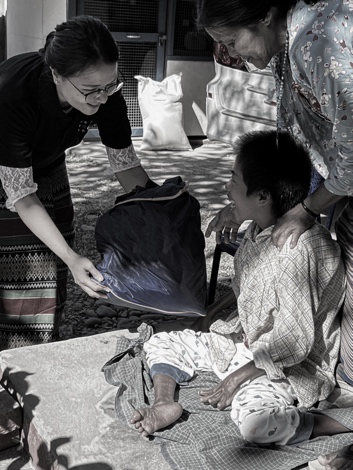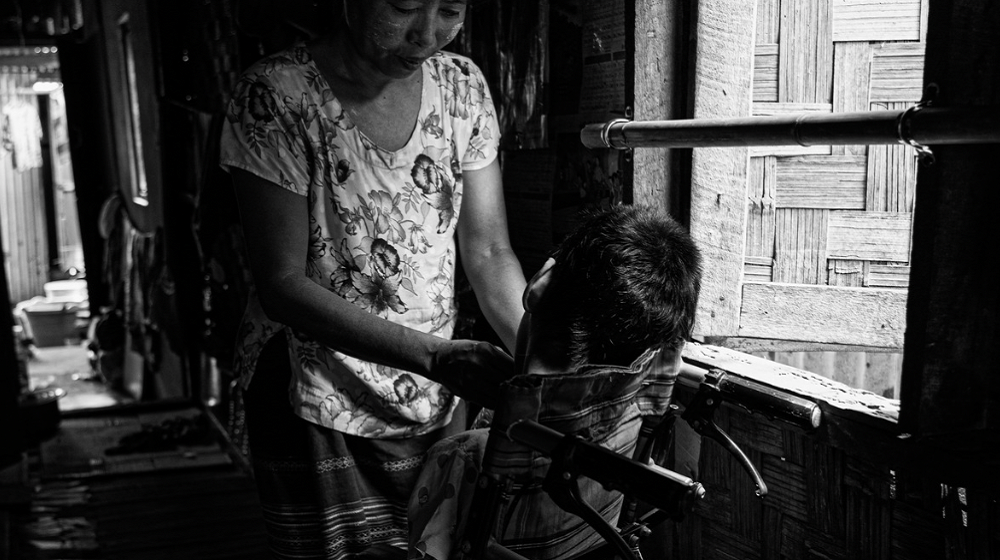“We (Women with disabilities) experience double discrimination due to our gender and disability status. Without having access to information and services, we are more vulnerable to face different forms of violence both inside and outside of our homes,” Nwe Nwe Win, a local woman with physical disability said.
According to the 2019 Myanmar Inter-censal Survey, there is an estimated of 3.5 million females with disabilities compared to an estimated 2.5 million of males. Women with disabilities are 2 to 4 times more likely to experience intimate partner violence. They are more vulnerable to experience the situation such as withholding medication and assistive devices (such as wheelchairs, hearing aid and white canes, etc.), denial of assistance, food, water, and basic needs.
In conflict related situation, women and girls with disabilities are especially vulnerable. UNFPA, the United Nations sexual and reproductive health agency, with the support of local partner organizations of persons with disabilities , provides dignity kits which include basic needs for women and girls with disabilities from affected communities to ensure their personal hygiene and dignity.
“I had to flee my home when armed clashes happened near my village. I couldn’t bring anything from my personal belongings due to my physical disability?. Thanks to the items included in the kits such as basic clothing and sanitary napkins, I can live with dignity and manage my personal hygiene even in the situation of emergency.” Nyein Nyein, a local woman with disabilities from conflict affected area.
Sexual and reproductive health and gender-based violence information is important for women with disabilities at the displaced sites to minimize the risks they might have. Without access to the sexual and reproductive health services and information, they are at higher risk of unwanted pregnancies and sexually transmitted infections. Women with disabilities are up to 10 times more likely to experience sexual violence. It is important to provide information and services for persons with disabilities considering their specific needs based on major types of disabilities.
Sian Nuam, a local woman with physical disability said, “I didn’t notice that I was experiencing gender-based violence at home. Thanks to the assistive devices (wheelchair) to go out by myself without needing assistance from my family anymore and the opportunity to attend gender-based violence awareness and mental health and psychosocial support sessions provided by local OPD with the support of UNFPA, I feel empowered and understand my rights.”
 Every person with disability has equal rights and choices as anyone else, as in global frameworks such as the Universal Declaration of Human Rights, the ICPD Programme of Action and the 2030 Agenda for Sustainable Development. To end discrimination and exclusion in our society, it is important that we leave no one behind.
Every person with disability has equal rights and choices as anyone else, as in global frameworks such as the Universal Declaration of Human Rights, the ICPD Programme of Action and the 2030 Agenda for Sustainable Development. To end discrimination and exclusion in our society, it is important that we leave no one behind.
Yu Myat Mun, Programme Analyst of UNFPA Myanmar said, “The integrated sexual and reproductive health, gender-based violence and mental health and psychosocial support services and information are lifesaving assets for the women and girls with disabilities especially who are at the conflict affected displaced sites, by safeguarding their dignity, and opportunity to practice their body rights with the informed choices.” UNFPA’s support also ensure the equal accessibility to the maternal and family planning services for the persons with disabilities promoting their sexual and reproductive rights as others.
Joshua, one of the leaders of local organization of persons with disabilities said, “The main barrier which women and girls with disabilities face in the society is not their disabilities, but, sadly, it is the discrimination of people from their communities. It hinders full and effective participation of women with disabilities in the communities. We must end this barrier - discrimination against persons with disabilities including women and girl and provide support to ensure their rights and dignity.”


